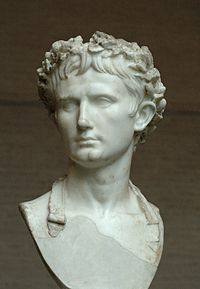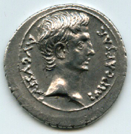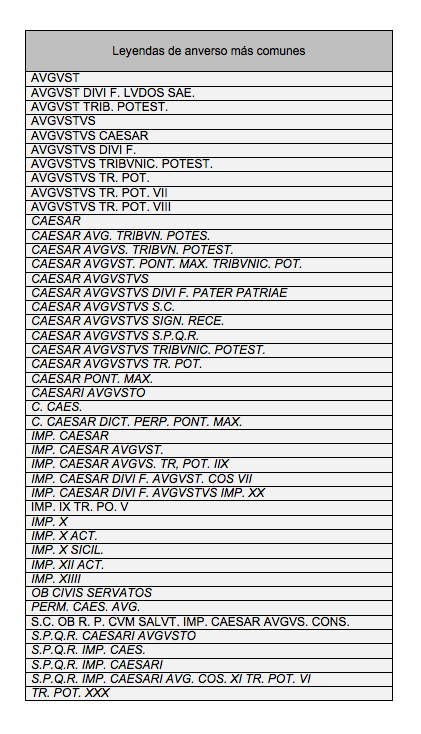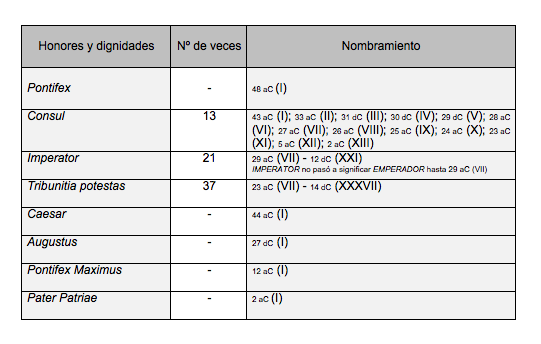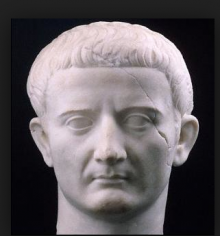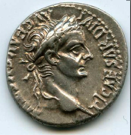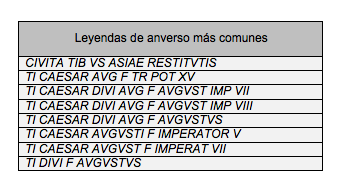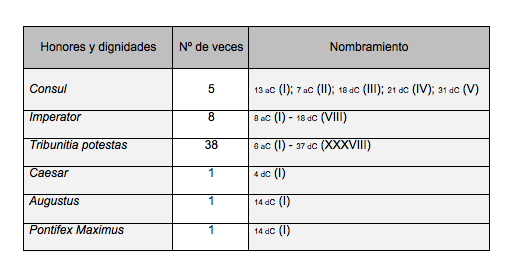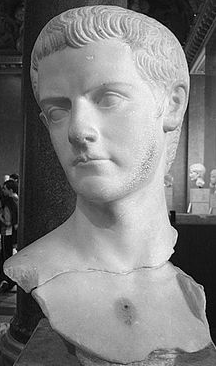Emperors
AUGUSTUS (Gaius Iulius Caesar Augustus)
He was the first emperor of Rome.
Born in 63 BC under the name of Gaius Octavius Turinus, was adopted by his great-uncle Julius Caesar (adoptio in hereditate), so since his death (44 BC) became known as Gaius Julius Caesar Octavianus (adoptees became part of the agnatic family of the new pater familias, but it was usual to keep their original names with the suffix -anus: Octavianus). At the request of Munatius Plancus in 27 BC the Senate awarded him the cognomen of Augustus and renamed Gaius Julius Caesar Augustus.
Because of the various names that he held, it is usually identified as Octavius during the period 63-44 BC, Octavianus between 44 and 27 BC and Augustus after 27 BC.
The young Octavian became heir of Julius Caesar in 44 BC. A year later he formed with Lepidus and Mark Antony a military dictatorship known as the Second Triumvirate.
As triumvir, Octavian ruled Rome and most of its provinces, seizing consular power after the deaths of the consuls Aulus Hirtius and Pansa and getting himself reelected every year. Later, the triumvirate would go crashing to the ambitions of its creators: Lepidus was forced into exile and Mark Antony ended up committing suicide after his defeat at the battle of Actium (31 BC).
With the demise of the Second Triumvirate, Octavian restored the early Roman Republic but only in appearance: the power is restored to the Senate, but in practice and in different ways Octavian would retain an autocratic power. Only after several years it came to consolidate the structure by which a Republican entity could be run by a single ruler. The result became known by the name of Principality.
The imperial title was never equated with dictator and, in fact, Octavian formally rejected this position. By law, Octavian had a set of perpetual powers conferred by the Senate, including those of tribune of the plebs and censor. He held the consulate until 23 BC, although its real power was growing thanks to its economic power and resources obtained from their conquests, creating client relationships throughout the entire empire, earning the respect of people and the loyalty of many soldiers and military veterans.
Augustus control over most of the legions led an armed threat that could be used against the Senate, allowing thus coercing the decisions. With this power to eliminate senatorial opposition by using arms, the Senate adopted a profile docile. Patronage, military power and the accumulation of charges his government became the model for subsequent rulers.
The reign of Augustus began a period of peace that lasted more than two centuries (pax augusta) only altered by border wars and the civil war that began after the death of Nero, which ended in less than a year with the appointment of Vespasian ( 69 AD).
Augustus expanded the Roman Empire, in the process ensuring its borders by subordination to Rome from the surrounding regions. Also he held a peace agreement with the Parthian Empire, reformed the tax system, developed road networks that had an official messaging system, consolidated a standing army and created the Praetorian Guard alongside security forces, both to maintain order to fight fires in Rome. Much of the city was rebuilt under his rule.
After his death in 14 AD, the Senate deified him and was worshiped by the Roman people. As a legacy, the names Caesar and Augustus would be adopted by all subsequent emperors.
TIBERIUS (Tiberius Caesar Augustus)
Born on November 16, 42 BC with the name of Tiberius Claudius Nero, it was the second emperor of Rome (14 AD - 37 AD).
Although born within the gens Claudia, he married into the imperial family (gens Iulia) when his mother Livia, divorced his biological father (Tiberius Claudius Nero) and married Gaius Julius Caesar Octavian (39 BC) while still pregnant would be his brother, Nero Claudius Drusus, who was born in 38 BC.
Tiberius married Vipsania Agrippina, daughter of Marcus Vipsanius Agrippa, Augustus' best friend, with whom had a son, Drusus Julius Caesar (14 BC), and two twin grandsons Tiberius and Germanicus (19 AD).
Tiberius married Vipsania Agrippina, daughter of Marcus Vipsanius Agrippa, Augustus' best friend, with whom had a son, Drusus Julius Caesar (14 BC), and two twin grandsons Tiberius and Germanicus (19 AD).
Tiberius remarried Augustus' daughter, Julia the Elder, and was adopted by the emperor on June 26, 4 AD.
In 25 BC he began his military career in participating in the Cantabrian Wars as a tribune.
In 24 BC, at the age of seventeen, he entered in politics under the direction of Augustus, being named Questor.
In 20 BC was sent to East under the command of Agrippa with the aim of recovering the legionary eagles that the Parthians had taken from Marcus Licinius Crassus (Battle of Carrhae, 53 BC), Lucius Decidius Saxa (40 BC) and Mark Antony (36 BC). After several years of negotiation, Tiberius led a powerful military force to Armenia, in order to convert the old kingdom into a client state of Rome and thereby create a threat on the border split.
After returning from the East, he was appointed Praetor and was sent to join his brother Drusus campaigns in the west. While Drusus focused forces in Gallia Narbonensis, Tiberius fought the tribes of the Alps and Gallia Transalpina.
When he returned to Rome, he was appointed Consul (13 BC) and about the same year his son Julius Caesar Drusus was born.
The death of Agrippa in 12 BC rose Tiberius and Drusus in succession scale. Tiberius asked Augustus divorce his wife Visania and marry his daughter Julia the Elder, widow of Agrippa. This marriage was a turning point in the life of Tiberius: marriage with Julia was never happy and gave one son who died in infancy.
Tiberius career continued to grow and after the deaths of Agrippa and his brother Drusus in 9 BC became a clear candidate for succession. He was appointed consul for the second time in 7 BC and in 6 BC was granted tribunitia potestas and control of the East.
In 6 BC, when it was about to take command of the East and thus become the second most powerful man in Rome, he announced he was leaving politics and retired to Rhodes.
With the withdrawal of Tiberius, the succession seemed destined to two young grandsons of Augustus, Gaius and Lucius Caesar. The situation became precarious suddenly with the death of Lucius on 2 AD. Augustus, at the request of Livia, allowed Tiberius to return to Rome. In 4 AD, Gaius died in Armenia and after exile for treason of his youngest grandson, Posthumous Caesar Augustus was left with no choice but to resort to Tiberius.
In 4 AD Tiberius was adopted as son and heir of Augustus.
Following the adoption, she received tribunicios powers for ten years, which would later be extended for another ten.
In 13 AD, Tiberius powers equaled those of Augustus himself and became co-princeps, so late Emperor should happen without any difficulty.
Augustus died in 14 AD, at the age of 76 years and Tiberius was confirmed as sole successor.
After the death of his son Julius Caesar Drusus in 23 AD, his reign ended in terror.
In 23 AD it seemed Druse would happen as emperor Tiberius.
For different reasons, Sejanus, praetorian prefect of Tiberius that maintained relations with the wife of Drusus (Livila), was the need to remove the son of the emperor. Ancient sources (Tacitus, Suetonius, Dio Cassius) agree that Drusus was poisoned with the complicity of Livilla. His death did not raise suspicions, to the point that Sejanus asked for the hand of Livilla in 25 dC (it was rejected) and that when three years later (26 AD) Tiberius exiled himself, left the administration in the hands of his two praetorian prefects, Lucio Elio Sejanus himself and Quintus Nevius Cordo Sutorius Macro.
The plot was discovered in 31 AD following the suicide of the ex-wife of Sejanus, Apicata. She left a letter to Tiberius claiming that Drusus had been killed with the complicity of Livilla. The Drusus' cupbearer and Livila's doctor were tortured and apparently confirmed the accusation. During the term of this year, would also perish Livila supposedly hunger locked up by her own mother Antonia Minor.
For different reasons, Sejanus, praetorian prefect of Tiberius that maintained relations with the wife of Drusus (Livila), was the need to remove the son of the emperor. Ancient sources (Tacitus, Suetonius, Dio Cassius) agree that Drusus was poisoned with the complicity of Livilla. His death did not raise suspicions, to the point that Sejanus asked for the hand of Livilla in 25 dC (it was rejected) and that when three years later (26 AD) Tiberius exiled himself, left the administration in the hands of his two praetorian prefects, Lucio Elio Sejanus himself and Quintus Nevius Cordo Sutorius Macro.
The plot was discovered in 31 AD following the suicide of the ex-wife of Sejanus, Apicata. She left a letter to Tiberius claiming that Drusus had been killed with the complicity of Livilla. The Drusus' cupbearer and Livila's doctor were tortured and apparently confirmed the accusation. During the term of this year, would also perish Livila supposedly hunger locked up by her own mother Antonia Minor.
He is remembered for his campaigns in Pannonia, Illyricum, Rhaetia and Germania (during which he laid the foundations of what later would become the northern border of the Empire) and also as a dark and gloomy ruler who never wanted to be emperor (Pliny the old called him tristissimus hominum, the saddest of men).
